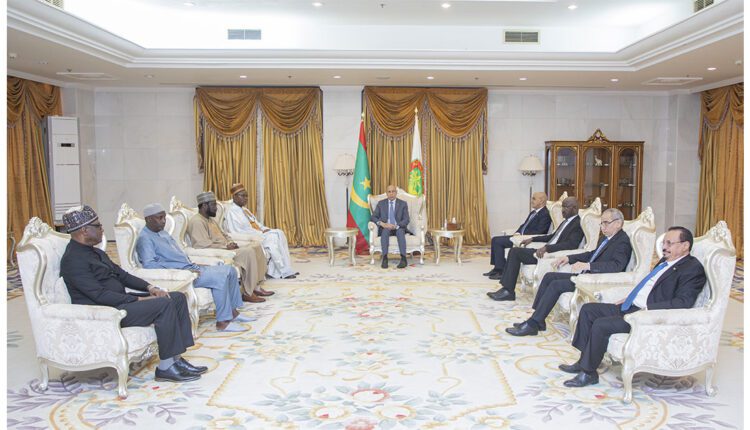Gambiaj.com – (Nouakchott, Mauritania) – The Gambia has mounted a high-level diplomatic campaign in Nouakchott, signaling a deliberate push to deepen bilateral cooperation with Mauritania across a wide range of strategic sectors, from fisheries to migration control and internal security.
Led by Vice President Mohamed Jallow and including Foreign Minister Mamadou Tangara, Interior Minister Abdoulaye Sanyang, Fisheries Minister Musa Drammeh, and Gambia’s Ambassador to Mauritania, Sheikh Omar Faye, the delegation met with Mauritanian President Mohamed Ould El Ghazouani at the presidential palace in what officials described as a “renewed dynamism” in Mauritanian-Gambian relations.
The timing and scale of this diplomatic outreach suggest that The Gambia is seeking to recalibrate and elevate its relations with its Sahelian neighbor in response to both domestic and regional imperatives.
Strengthening Regional Alliances
This initiative comes as West African countries increasingly turn toward regional partners to confront shared security and economic challenges.
For The Gambia, whose economy and border security remain vulnerable to instability in the region, Mauritania represents a key ally.
During the talks, President Ghazouani and the Gambian delegation reaffirmed their commitment to strengthening bilateral ties.
Discussions focused on expanding cooperation in mutually beneficial sectors and aligning efforts to address transnational threats, including terrorism, irregular migration, and drug trafficking—issues that are particularly pressing given Mauritania’s position as a Sahelian frontline state and The Gambia’s vulnerability as a coastal entry point.
Interior and Security, Fisheries in Focus as Foreign Ministers Signal Political Commitment
A significant dimension of the diplomatic mission revolved around internal security. Gambian Interior Minister Abdoulaye Sanyang held in-depth discussions with his Mauritanian counterpart, Mohamed Ahmed Ould Mohamed Lemin, focusing on the fight against terrorism and drug trafficking, migration regulation, and improving the welfare of each country’s nationals residing in the other’s territory.
This marks a potential turning point in cross-border law enforcement coordination, especially as both countries grapple with increased trafficking routes and extremist threats spilling over from the wider Sahel.
Equally prominent on the agenda was maritime cooperation. Gambian Fisheries Minister Musa Drammeh met with Mauritanian Fisheries Minister El Vadil Ould Ahmed Louly to explore expanded collaboration in fisheries, maritime safety, and port infrastructure.
With Mauritania’s extensive Atlantic coast and established fisheries industry, The Gambia appears eager to tap into expertise and potentially negotiate access and investment agreements to modernize its own underdeveloped fisheries sector.
On the sidelines of the Sixth Session of the Mauritania-Gambia Grand Joint Commission for Cooperation, Foreign Ministers Mamadou Tangara and Mohamed Salem Ould Merzoug underscored the “excellent cooperative relations” between the two countries.
They discussed expanding economic, diplomatic, and technical partnerships, suggesting that the current momentum may lead to new agreements or frameworks in the months ahead.
Broader Context: The Gambia’s Regional Strategy
This diplomatic outreach fits into a broader pattern of The Gambia under President Adama Barrow seeking to strengthen bilateral and regional cooperation to compensate for declining international donor engagement and rising domestic demands.
As the transitional justice process slows and economic pressures mount, strategic bilateral relations with countries like Mauritania—whose growing energy potential and Sahelian leadership role offer both economic and geopolitical value—are increasingly important.
Moreover, the high-profile nature of the delegation, led by the Vice President himself, highlights the seriousness with which Banjul is treating this relationship, particularly as regional alignments shift amid the decline of French and other Western influence in parts of the Sahel.
This week’s diplomatic flurry in Nouakchott signals that The Gambia is not merely maintaining good-neighborly ties but proactively investing in strategic regional diplomacy.
Whether this renewed energy translates into tangible benefits—such as improved trade flows, joint security operations, or access to Mauritania’s emerging blue economy—will depend on how both governments move from declarations of goodwill to concrete policy execution.










